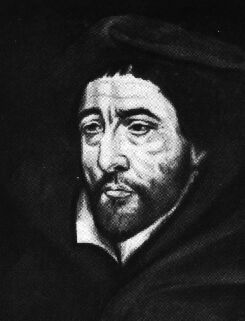
Michael Baius
Michael Baius (1513 – 16 September 1589) was a Belgian theologian. He formulated the school of thought now known as Baianism.
Life[edit]
He was born at Meslin L'Eveque near Ath in Hainaut as Michel De Bay, the son of Jean de Bay, a farmer. De Bay studied humanities in Brugelette and in Enghien and in 1533 he began studying philosophy at the Grand College het Varken of Leuven University. From 1535 he also studied theology at the Pope Adrian VI College.[1] He was an excellent student and was ordained a priest in 1542,[2] and was appointed director of the Standonck-College in Leuven.
In 1544 De Bay obtained his doctorate in philosophy and became a teacher at the College het Varken. In 1549 De Bay was appointed professor of scholastic philosophy. The following year, De Bay also obtained a license in theology and became president of the College Adrian, and also substituted for the professor of Holy Scripture, who was then absent at the Council of Trent. From February to August 1553, he was the rector of the university.[3] Baius had very early formed a close friendship with Jean Hessels.
While Chancellor Ruard Tapper and Josse Ravesteyn, Professor of Theology were at the Council of Trent, Baius and Hessels took the occasion to introduce new methods and new doctrines. They believed that Catholic apologists were seriously handicapped by their reliance on the authority and methods of the Scholastics, and that if instead of appealing to the writings of St. Thomas as the ultimate criterion of truth they were to insist more on the authority of the Bible and of the works of the Early Fathers, such as St. Cyprian, St. Jerome, and St. Augustine, they would find themselves on much safer ground, and their arguments would be more likely to command the respect of their opponents.[4]
On his return from Trent in 1552, Tapper asked Cardinal de Granvelle, archbishop of Mechelen, to intervene. Granvelle succeeded in quieting the innovators for a while. De Bay's theories were very popular with theology students who spread it further. This was met with much opposition, and around 1558, later Cardinal Antoine Perrenot de Granvelle and Viglius tried unsuccessfully to persuade De Bay to make some adjustments to his positions. However, in 1560 at the request of the Franciscans, the Sorbonne condemned 18 of his statements.[3] Baius answered the censure in a memoir now lost, and the controversy only increased in acridity. Pope Pius IV, through Cardinal Granvelle, imposed silence upon both Baius and the Franciscans, without, however, rendering any doctrinal decision.[1]
Death[edit]
He died, still holding these two offices, in 1589. His writings are described by Adolf Harnack as a curious mixture of Catholic orthodoxy and unconscious tendencies to Protestantism. His principal works were published in a collected form at Cologne, 1696; some large treatises were excluded. There is a study of both books and author by Linsenmann, Michael Baius und die Grundlegung des Jansenismus, published at Tübingen in 1867.[5]
Beliefs[edit]
The Bay based his theology on Holy Scripture and the Fathers of the Church, especially on the teaching of Augustine of Hippo, introducing deviant scholastic terminologies. His doctrine, later referred to as Baianism, was based on sin, free will, and grace of God along with the fight against papal infallibility, saying that the episcopal legal power comes directly from God.[3] Joseph Sollier, writing in the Catholic Encyclopedia sees Baius' as a precursor to the Jansenism and the Port-Royal theologians such as Blaise Pascal.[1]
Further reading[edit]
Henri de Lubac, Augustinianism and Modern Theology (Herder & Herder) ISBN 0-8245-1802-0 This has a treatment of Baius's theology, especially his interpretations of Augustine and his relationship to Jansenius and Jansenism.